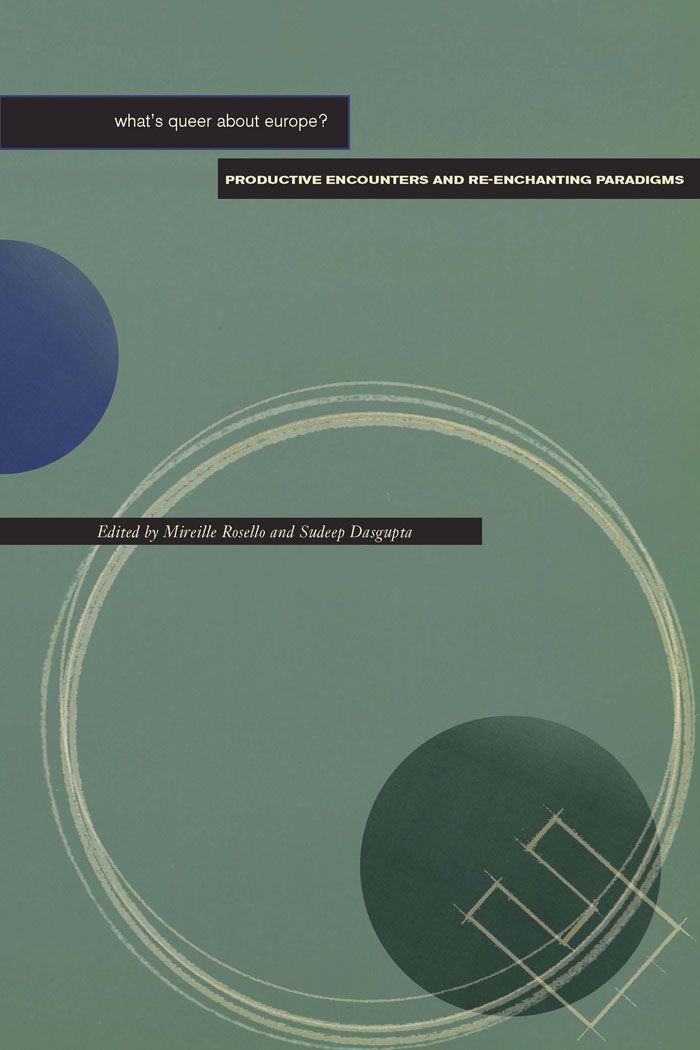What's Queer about Europe?
Productive Encounters and Re-enchanting Paradigms

This book can be opened with

What’s Queer about Europe? examines how queer theory helps us initiate disorienting conjunctions and counterintuitive encounters for imagining historical and contemporary Europe. This book queers Europe and Europeanizes queer, forcing a reconsideration of both. Its contributors study Europe relationally, asking not so much what Europe is but what we do when we attempt to define it.
The topics discussed include: gay marriage in Renaissance Rome, Russian anarchism and gender politics in early-twentieth-century Switzerland, colonialism and sexuality in Italy, queer masculinities in European popular culture, queer national identities in French cinema, and gender theories and activism. What these apparently disparate topics have in common is the urgency of the political, legal, and cultural issues they tackle. Asking what is queer about Europe means probing the blind spots that continue to structure the long and discrepant process of Europeanization.
This book stages multiple encounters between Europe and Queer as two paradigms of transgression – an unusual constellation that results in an imaginative set of investigations of different identity intersections, moving freely across time and space, and between cultural and political contexts in a wide range of genres and media. The essays deal with fascinating historical and contemporary phenomena and are written in a mode of communicative critique that opens up inner contradictions through unexpected dialogues. The result is an invitation to queer Europe transnationally, empowering but without utopian illusions, and far beyond the ordinary discourses in these two fascinating fields.
In their stating that 'Queer and Europe defamiliarize each other…' in their introduction to What's Queer About Europe, Dasgupta and Rosello open up a wonderfully inventive field of uncanny mismatches between subject and method. They unleash the creative justaposition of different cultural and political materials that range from the Roman travels of Montaigne to the Eurovsion Song Contest, from the critique of colonialism to the critical, queer subject in contemporary French cinema, or the strangely contradictory needs for the normative and the queer in the legal regulation of migration. This is truly a feast of trans-disciplinary defamiliarizing, at once learned and witty, challenging and profoundly necessary if queer studies or area studies are to take on a new vivacity that embodies the commonality and dissensus of out times.
Mireille Rosello teaches at the University of Amsterdam (Amsterdam School of Cultural Analysis). She focuses on globalized mobility and on queer thinking. Recent publications include a coedited collection of articles on multilingualism in Europe (Multilingual Europe, Multilingual Europeans, 2012, with Laszlo Maracz), and monographs such as The Reparative in Narratives: Works of Mourning in Progress (2010), France and the Maghreb: Performative Encounters (2005), and Postcolonial Hospitality (2002). She is currently working on a collection of essays on queer Europe (What Is Queer about Europe: Excentric Readings in History, Politics and Culture, coedited with Sudeep Dasgupta, forthcoming from Fordham University Press).
Sudeep Dasgupta (Author)
Sudeep Dasgupta is Associate Professor in the Department of Media and Culture at the University of Amsterdam. He is affiliated with the Amsterdam School of Cultural Analysis (ASCA), the Amsterdam Centre for Globalization Studies (ACGS). His publications include the edited volume Constellations of the Transnational: Modernity, Culture, Critique (2007), articles in Parallax, South Asian Studies, (In)Visible Culture, Transformations, Borderlands, and articles in anthologies on aesthetics and visual culture, critical theory, film studies, media studies, postcolonial and queer theory.

